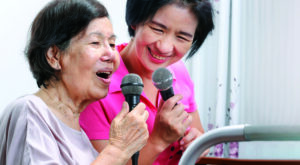 Just like it’s important to maintain your physical health by adopting an in-home exercise regime, it is important to maintain your mental health by engaging in challenging activities that promote cognitive function. Changes in cognitive function are a natural part of aging. With time, your brain loses agility and can deteriorate further if you don’t take steps to maintain it. The changes are complex and varied. But aging doesn’t have to mean an inevitable decline as individual factors like genetics, health and lifestyle come into play.
Just like it’s important to maintain your physical health by adopting an in-home exercise regime, it is important to maintain your mental health by engaging in challenging activities that promote cognitive function. Changes in cognitive function are a natural part of aging. With time, your brain loses agility and can deteriorate further if you don’t take steps to maintain it. The changes are complex and varied. But aging doesn’t have to mean an inevitable decline as individual factors like genetics, health and lifestyle come into play.
According to the Alzheimer’s Association, Alzheimer’s is the most common cause of dementia and accounts for 60 to 80% of dementia cases. Cases will almost double every 20 years. Due to the disease’s progressive nature, dementia symptoms gradually worsen over several years. Early signs of Alzheimer’s can include a decline in processing speed, working memory and long-term memory.
Although there is no cure, there are many activities that may help reduce the risk and support cognitive health in older adults. While they should not be seen as sole preventative measures, research has demonstrated that several lifestyle modifications and even participating in games and activities may lower your risk of cognitive decline to help keep your brain as healthy as possible as you age. Research has shown that activities that provide social engagement are the best in terms of boosting cognitive function.
Taking proactive steps like maintaining a physically active lifestyle and engaging socially with others can significantly influence your cognitive well-being throughout life and may prevent the onset of symptoms of Alzheimer’s, according to the Alzheimer’s Association. Whether you are trying to retain or increase cognitive function, it is also important to remember that variety is key. Engaging in an interactive and diverse range of activities is vital to challenging different areas of the brain. Finding activities you enjoy and can stick with also allows you to form and maintain healthier and sustainable habits.
“To keep your mind active, it is important to seek out stimulating activities that expose your mind to new topics,” says Ivy. “When these activities include loved ones—friends, grandchildren, neighbors and other community members—there’s the added benefit of social engagement, which is associated with reduced rates of disability and mortality, and may also reduce the risk for depression.”
Activities and Apps
The following offer fun and engaging ways for families and grandchildren to train their brains together with their grandparents:

WORDLE is a word puzzle that gives players six tries to guess a five letter word. Each guess gives you color coded clues: green for correct letters in the right spot, yellow for correct ones in the wrong spot, and gray for ones not in the word at all. You use this feedback to strategize your next guesses. There’s a secret word each day, so everyone around the world is trying to guess the same one! Wordle is recommended for ages 14 and up, but statistically, older adults are the best Wordle players, with an average win percentage of 81%.
Wordle promotes working memory, logic and reasoning, vocabulary building and concentration— all things that help increase cognitive function. The Wordle Together function enables you to play with friends and family. There are different versions of Wordle available online and in app stores, all of which are free; many players prefer The New York Times Wordle.
SUDOKU is a brainteaser played on a grid. The goal is to fill the squares with numbers 1 through 9, ensuring no row, column or subgrid contains a duplicate number. It requires logical deduction.
Regular Sudoku practice can benefit your cognitive function because it strengthens working memory by keeping track of potential placements, and improves logic and reasoning as you analyze the grid and make deductions.
Usdoku lets multiple players play sudoku on the same board with their own devices simultaneously. Once you select the difficulty level, you take turns making moves on the grid. Sudoku and Usdoku challenge your brain and keep your cognitive skills sharp. Find free Sudoku and Usdoku online or purchase the puzzle books on Amazon or at your local bookstore.
 LIFE STORY INTERVIEW KIT is a 150-question card deck created to help capture and preserve your stories or those of your loved ones. The conversation-based card game’s questions/prompts are categorized by early life, midlife, and later life and reflection, sparking recollections of past experiences. It is a fun way to preserve memories, spend quality time with your loved ones, deepen your connection with them, and learn new things about them. Although maintaining brain fitness through challenging activities is important, activities that prompt human connection and interaction are best—no matter the age.
LIFE STORY INTERVIEW KIT is a 150-question card deck created to help capture and preserve your stories or those of your loved ones. The conversation-based card game’s questions/prompts are categorized by early life, midlife, and later life and reflection, sparking recollections of past experiences. It is a fun way to preserve memories, spend quality time with your loved ones, deepen your connection with them, and learn new things about them. Although maintaining brain fitness through challenging activities is important, activities that prompt human connection and interaction are best—no matter the age.
The Life Story Interview Kit and similar card kits can be purchased on Amazon. Downloadable apps are also available, some of which are free.
LUMOSITY is a popular, free brain training app designed to target and improve various cognitive skills. It offers a variety of games and activities that challenge memory, attention span, processing speed, flexibility and problem-solving.
Lumosity promotes cognitive function in several ways. By regularly performing these targeted exercises, you can strengthen your working memory, improve your ability to focus and filter out distractions, and enhance your mental agility by tackling the game’ challenges.
Non-apps
Legos, puzzles, board games and word searches are also activities younger children and grandparents who don’t have or want access to electronic devices can participate in together.
Whatever game, activity or app you choose to enhance cognitive health, remember that “Remaining socially active supports brain health and may possibly delay the onset of dementia,” says Ivy.
ALZHEIMER’S ASSOCIATION HAWAI‘I
677 Ala Moana Blvd., Ste. 301, Honolulu, HI 96813
24/7 Helpline: 800-272-3900
To join a support group or get more information:
808-591-2771 | alz.org/Hawaii
alz.org/help-support/i-have-alz/younger-onset



Leave a Reply